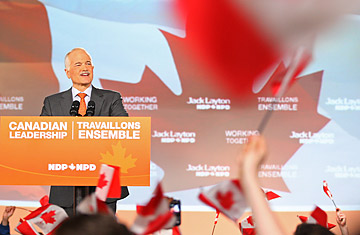
New Democratic Party (NDP) leader Jack Layton speaks to his supporters after election results were announced in Toronto, Canada, May 2, 2011.
Canada's opposition politics have taken a hard left turn, with some bizarre consequences. The fourth general election in just seven years saw Canadians answer conservative Prime Minister Stephen Harper's call for political stability by returning him to power with the majority government that had previously eluded him. The election's real surprise, however, was the fact that the pro-labor New Democratic Party (NDP) led by Salty Jack Layton placed second for the first time ever — thanks to strong support from Quebec's French-speaking voters who normally support the separatist Bloc Québécois.
But the new crop of legislators the NDP will bring to parliament are hardly conventional political hacks. They include nine university students and recent graduates, a former Communist Party candidate, and a woman who spent part of her campaign vacationing in sunny Las Vegas.
The NDP's Pierre-Luc Dusseault, a 19-year-old student at the University of Sherbrooke, became the youngest member ever elected to Canada's parliament. He'll have to give up his summer job at a golf course to take office with a $158,000 salary and staff. Before launching a career in federal politics, the biggest point on Dessault's resume may have been representing his high school swim team at regional finals.
Has Canada lost its marbles or is something else going on?
Not everyone in Canada thinks it's such a bad idea electing newbies who might otherwise be landing jobs at Starbucks or Kinko's. Their victory was a sign that some candidates from this social-media generation ran very effective Facebook and Twitter campaigns that eclipsed traditional campaign work.
Mathieu Ravignat, the former Community Party candidate and executive with the Ottawa Medieval Sword Guild, toppled a political heavyweight in foreign minister Lawrence Cannon by more than 8,000 votes. Alexandrine Latendresse, a 26-year-old University of Laval linguistics student whose Facebook page reveals a weakness for iced vodka and procrastination, also ousted a sitting cabinet minister.
"Maybe it's about time this happened," says Derek Leebosh with Toronto-based Environics Research Group, a company specializing in public opinion polls. "Parliament should reflect the population of Canada rather than being a club for old fuddy-duddies."
He attributes the NDP's unprescedented victory in Quebec, where it won 58 of 75 seats, to a sudden desire for radical change. Voters had grown disillusioned with the Bloc Québécois' inability to secure any political victories with its shrill agenda seeking independence for the French-speaking territory. In choosing an alternative, they skipped over both the Conservatives and Liberals, Canada's traditional ruling parties.
But it was NDP leader Layton, who in the final days of his campaign faced questions about being discovered naked by Toronto police in a Chinatown massage parlor years earlier, that proved to be unstoppable. The affable cancer survivor scored point after point against both PM Harper and the Harvard professor-turned-Liberal Party leader Michael Ignatieff in both national debates. He won over Quebeckers with his folksy style, brandishing a big smile and a cane from recent hip surgery during an appearance on a popular French-language talk show.
When the campaign began in early April, support for the NDP in Quebec stood at 21% to the Bloc's 34%, according to polling firm Environics. Three weeks later, those numbers had flipped, with the NDP at 41% to the Bloc's 28% — thanks largely to Layton's performance in the public eye.
Many voters in Quebec said they had voted NDP to give federalism a last fighting chance, after what they view as the failure of other national parties. But what chance does the new official opposition have of satisfying Quebec's traditional gripes — which include the call for autonomy over language and immigration policy — while relying on a large contingent of MPs with training wheels?
It's fair to say that many NDP candidates did not expect to win seats, and they face a steep learning curve that will include language lessons for unilingual Anglophones representing French-only constituencies.
"The NDP will need to turn its mind to how it can consolidate support in Quebec without alienating supporters in the rest of the country," says Robert Drummond, professor of political science and public policy at Toronto's York University.
That balancing act could well prove to be the undoing of NDP's hold on the role of official opposition. Throw in inexperienced MPs more used to writing exams than they are to Question Period on the Hill, and it's easy to imagine Quebec voters again feeling shut out in Ottawa. That could lead to another independence referendum in Quebec in four years, in which separatists would argue that Ottawa has proven itself unable to deliver. But before such a rendez-vous with history, at least Canada's newest MPs will have a few years to work on their French.
